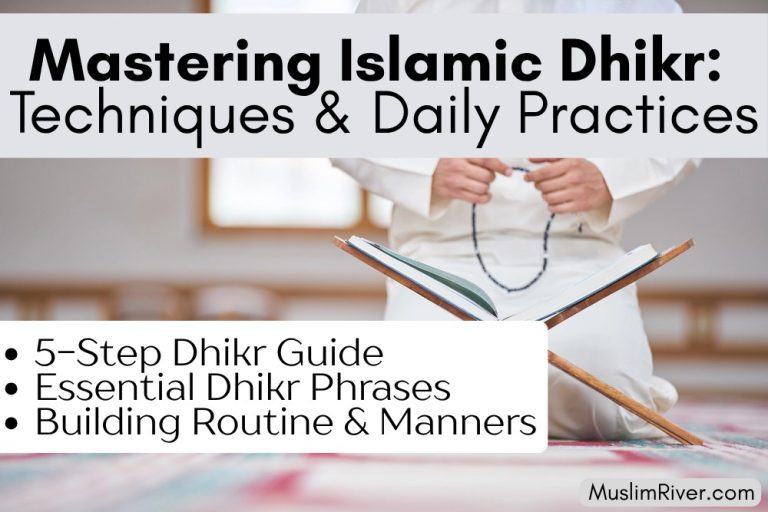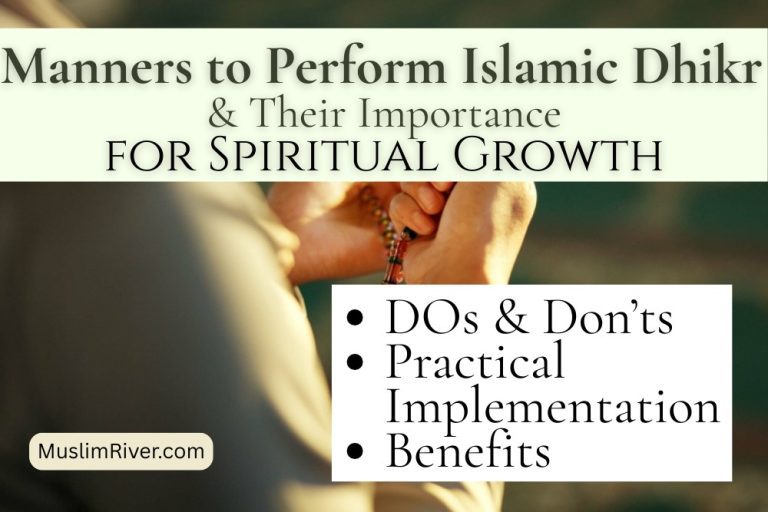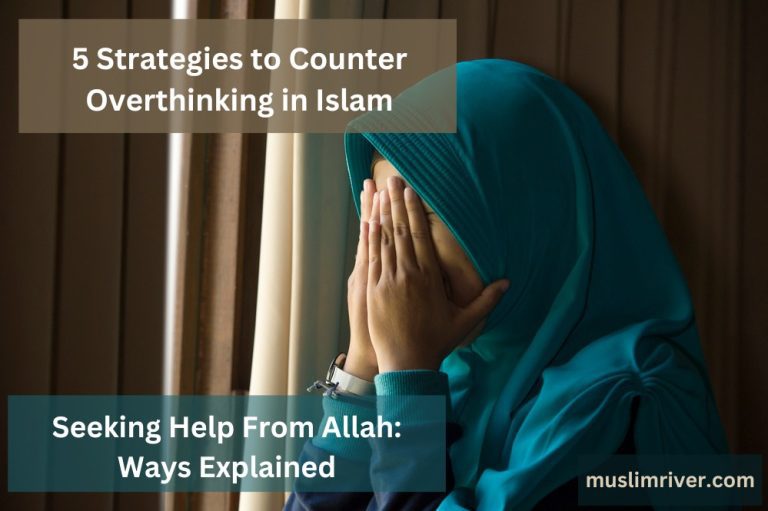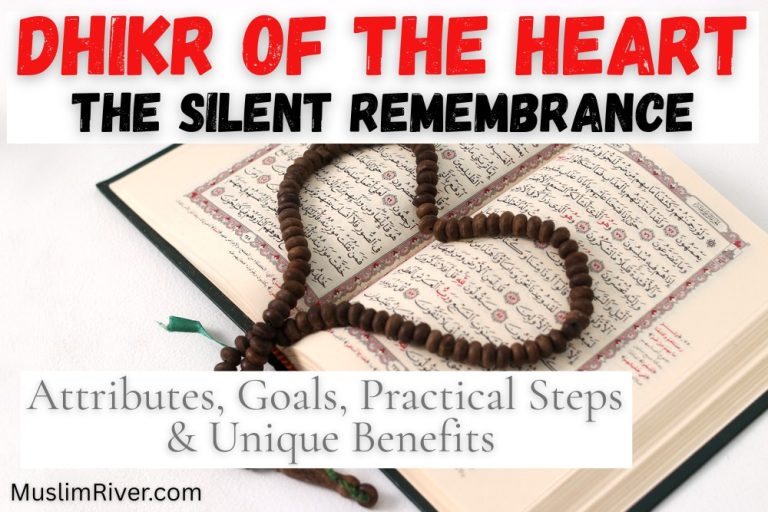Islamic Dhikr For: Stress Relief, Emotional Regulation & Anxiety
How often do you feel overwhelmed by anxiety?
What if a daily practice of Dhikr could ease your mind and empower it?
Dhikr is not only about spiritual enlightenment but also about real, tangible benefits that affect both mind and body.
Whether you’re coping with stress from work, personal struggles, or just the overwhelming pace of modern life, Dhikr provides a holistic approach to easing your burden.
In this article, we will explore the causes of stress, dhikrs for stress relief, emotional regulation, overcoming anxiety, its healing plus physical effects, and discover how Dhikr holds the power to mitigate these impacts through a holistic lens. Along how you can make it part of your life.
Let’s embark on this journey together, learning how this sacred practice can empower you to lead calmer, more focused lives, irrespective of your backgrounds.
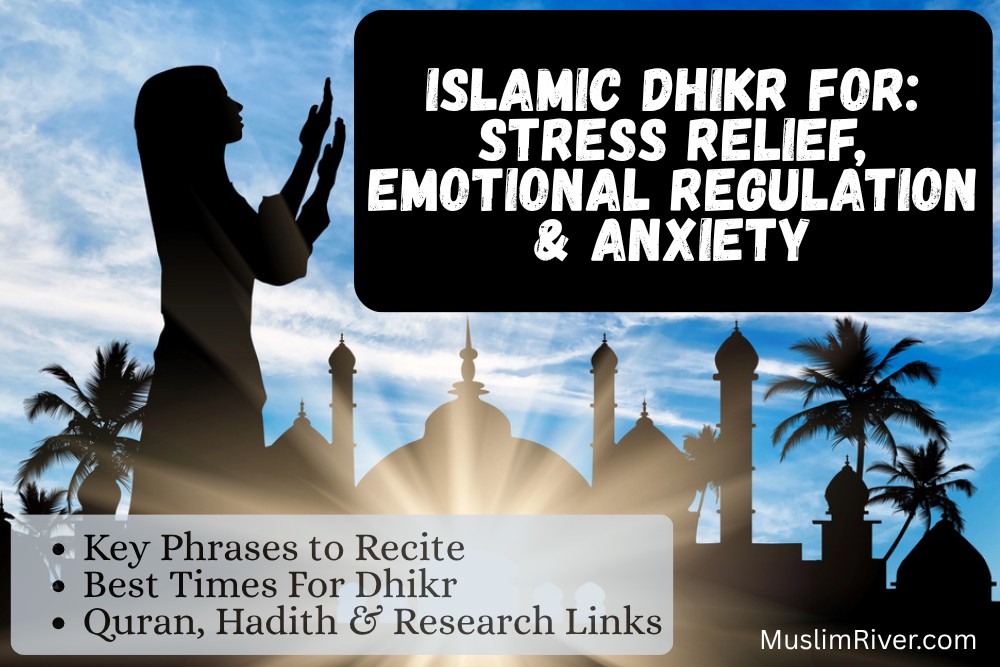
Dhikr for Stress Relief – Remembrance That Comforts the Heart
Caught in a frenzy of deadlines and demands? Imagine finding peace with just a few words of Dhikr.
I’ll walk you through how each Dhikr phrase, such as SubhanAllah, Alhamdulillah, Allahu Akbar, La ilaha illAllah, showing you practical ways to integrate them into your daily life for better mental health.
Reflecting on these Dhikr phrases empowers you to dismantle the pressures of daily life, offering spiritual insights that promote profound inner peace and emotional regulation.
1. “SubhanAllah” (Glorifying Allah’s Perfection) — When we say “SubhanAllah,” we acknowledge the absolute perfection of Allah, redirecting our focus from our transient worries to His eternal greatness.
This practice is highlighted in the Hadith where the Prophet Muhammad (peace be upon him) said,
Two words are light on the tongue, weigh heavily in the balance, and are loved by the Most Merciful One: Subḥānallāhi wa biḥamdih, Subḥānallāhi ‘l-`Aẓīm. Allah’s Messenger (ﷺ) said: Two words are light on the tongue, weigh heavily in the balance, and are loved by the Most Merciful One: Glorified is Allah and praised is He, Glorified is Allah the Most Great.
2. “Alhamdulillah” (Cultivating Gratitude) — “Alhamdulillah” means all praise and thanks belong to Allah.
Consistently reciting this makes us more aware of the blessings that often go unnoticed.
فَٱذْكُرُونِىٓ أَذْكُرْكُمْ وَٱشْكُرُوا۟ لِى وَلَا تَكْفُرُونِ ١٥٢
Fathkuroonee athkurkumwashkuroo lee wala takfuroon
remember Me; I will remember you. And thank Me, and never be ungrateful.
Surah Al-Baqarah – 152 – Quran.com
This verse encourages us to express gratitude, thereby reducing stress and inviting more joy into our lives.
3. “Allahu Akbar” (Allah is Greater) — “Allahu Akbar” translates to “Allah is the Greatest.”
It’s a reminder that no matter how overwhelming any challenge might seem, Allah is greater than all our troubles.
In Quran Allah says:
ٱتْلُ مَآ أُوحِىَ إِلَيْكَ مِنَ ٱلْكِتَـٰبِ وَأَقِمِ ٱلصَّلَوٰةَ ۖ إِنَّ ٱلصَّلَوٰةَ تَنْهَىٰ عَنِ ٱلْفَحْشَآءِ وَٱلْمُنكَرِ ۗ وَلَذِكْرُ ٱللَّهِ أَكْبَرُ ۗ وَٱللَّهُ يَعْلَمُ مَا تَصْنَعُونَ ٤٥
Otlu ma oohiya ilayka minaalkitabi waaqimi assalata inna assalatatanha AAani alfahsha-i walmunkariwalathikru Allahi akbaru wallahuyaAAlamu ma tasnaAAoon
[Prophet], recite what has been revealed to you of the Scripture; keep up the prayer: prayer restrains outrageous and unacceptable behaviour. Remembering God is greater: God knows everything you are doing.
The Prophet Muhammad (peace be upon him) described the greatness of this phrase in numerous ahadith, emphasizing its role in overcoming difficulties.
4. “La ilaha illAllah” (Affirming Allah’s Sovereignty) —“La ilaha illAllah,” there is no deity but Allah, is a profound declaration of faith that stabilizes the believer’s heart.
Jabir bin ‘Abdullah said: “I heard the Messenger of Allah (ﷺ) say:
‘The best of remembrance is La ilaha illallah (None has the right to be worshipped but Allah), and the best of supplication is Al-Hamdu Lillah (praise is to Allah).'”
To begin your Dhikr practice, choose one of these phrases and repeat it throughout the day, especially during moments of stress or when you seek tranquility.
Start with a few minutes each day and gradually increase as you feel comfortable. Consistency and mindful presence—focusing deeply on the meanings—are key.
Embracing Dhikr transforms daily stress into serenity, enhancing both mental and spiritual health. This practice strengthens your emotional resilience, directly aligning with the goals of reducing stress and regulating emotions.
Next, in “Dhikr for Emotional Regulation – How Dhikr Heals the Body?” we will explore the physical health benefits of Dhikr, showing how it impacts not just the mind and spirit but also the body.
Dhikr for Emotional Regulation – How Dhikr Heals the Body?
How could a simple phrase repeated daily change the way you feel and react to stress?
I’ll walk you through how each Dhikr phrase, such as Astagfirullah, Ya Salaam, Ya Latif, Ya Wadood, can specifically aid in reducing stress and fostering emotional peace, showing you practical ways to integrate them into your daily life.
Dhikr goes beyond traditional stress management techniques by tapping into spiritual depths, fostering an inner calm that withstands external pressures and challenges.
Allah tells us in the Quran:
ٱلَّذِينَ ءَامَنُوا۟ وَتَطْمَئِنُّ قُلُوبُهُم بِذِكْرِ ٱللَّهِ ۗ أَلَا بِذِكْرِ ٱللَّهِ تَطْمَئِنُّ ٱلْقُلُوبُ ٢٨
those who believe and whose hearts find comfort in the remembrance of Allah. Surely in the remembrance of Allah do hearts find comfort.
Source: Surah Ar-Ra’d – 28 – Quran.com
This verse encourages us to use His beautiful names in our supplications, affirming that each name carries specific blessings and benefits.
1. “Astagfirullah” (Cleansing Emotional Guilt and Regret) — “Astagfirullah,” meaning “I seek forgiveness from Allah,” is essential for emotional cleansing.
It helps release the burden of guilt and encourages a fresh start.
In Quran, Allah says:
Ibn ‘Abbas (May Allah be pleased with them) said: The Messenger of Allah (ﷺ) said, “If anyone constantly seeks pardon (from Allah), Allah will appoint for him a way out of every distress and a relief from every anxiety, and will provide sustenance for him from where he expects not.” [Abu Dawud].
2. “Ya Salaam” (Invoking Divine Peace) — Reciting “Ya Salaam,” which translates to “O Source of Peace,” brings tranquility to our hearts.
This name of Allah reassures us of His encompassing peace, which calms the spirit during tumultuous times.
أَسْـتَغْفِرُ الله (ثَلاثاً) اللّهُـمَّ أَنْـتَ السَّلامُ وَمِـنْكَ السَّلام تَبارَكْتَ يا ذا الجَـلالِ وَالإِكْـرام
Astaghfirullāh (three times) Allāhumma antas-salām, wa minkas-salām, tabārakta yā dhal-Jalāli wal-‘Ikrām.
I seek the forgiveness of Allah (three times). O Allah, You are Peace, and from You comes peace. Blessed are You, O Owner of majesty and honor.
3. “Ya Latif” (Seeking Allah’s Gentleness) — “Ya Latif” means “O the Most Subtle One,” and it helps us recognize Allah’s gentle care in our lives.
Ya Lateefu” has a very deep meaning, it means Ever-Discreetly Gentle, The Most Affectionate, The Knower and Possessor of all Sublities.
In Quran Allah says:
ٱللَّهُ لَطِيفٌۢ بِعِبَادِهِۦ يَرْزُقُ مَن يَشَآءُ ۖ وَهُوَ ٱلْقَوِىُّ ٱلْعَزِيزُ ١٩
Allahu lateefun biAAibadihiyarzuqu man yashao wahuwa alqawiyyu alAAazeez
Allah is Ever Kind to His servants. He provides ˹abundantly˺ to whoever He wills. And He is the All-Powerful, Almighty.
This Dhikr reassures us that Allah manages our affairs with subtlety and grace, often beyond our understanding. Engaging in this Dhikr cultivates trust and reduces the harshness of our trials.
It was narrated from Abu Hurairah that the Messenger of Allah(ﷺ) said:
“Allah is Gentle and loves gentleness, and He grants reward for it that He does not grant for harshness.”
4. “Ya Wadood” (Reminding of Allah’s Unconditional Love) — “Ya Wadood,” translating to “O Loving One,” emphasizes Allah’s boundless love for His creation.
This phrase is a comforting reminder, especially when we feel isolated or unloved.
The Prophet Muhammad (peace be upon him) described Allah’s love as surpassing a mother’s love for her child, illustrating the depth of divine affection.
Narrated `Umar bin Al-Khattab: Some Sabi (i.e. war prisoners, children and woman only) were brought before the Prophet (ﷺ) and behold, a woman amongst them was milking her breasts to feed and whenever she found a child amongst the captives, she took it over her chest and nursed it (she had lost her child but later she found him) the Prophet said to us, “Do you think that this lady can throw her son in the fire?” We replied, “No, if she has the power not to throw it (in the fire).” The Prophet (ﷺ) then said, “Allah is more merciful to His slaves than this lady to her son.”
In Quran Allah says:
أَلَا يَعْلَمُ مَنْ خَلَقَ وَهُوَ ٱللَّطِيفُ ٱلْخَبِيرُ ١٤
Ala yaAAlamu man khalaqa wahuwa allateefualkhabeer
How could He not know His Own creation? For He ˹alone˺ is the Most Subtle, All-Aware.
Source: Surah Al-Mulk – 14 – Quran.com
Dhikr enhances areas of the brain responsible for emotion regulation and stress management, supporting overall mental health and resilience.
As we integrate these phrases into our daily lives, we not only fulfill a religious duty but also embrace a powerful form of spiritual medicine that heals and harmonizes the body and soul.
Next we will look into Dikr for overcoming anxiety.
Dhikr for Overcoming Anxiety
Many believe anxiety can only be tackled with modern medicine, yet Dhikr offers a time-tested, soul-soothing alternative.
I’ll break down the profound impact that ‘Hasbiyallahu la ilaha illa Huwa,’ ‘Inna Allah ma’ana,’ and ‘La hawla wa la quwwata illa billah’ can have on your anxiety levels and overall mental health.
These Dhikr phrases are not just spiritual chants but powerful affirmations that recenter your focus and dissolve anxiety, offering you a clear path to tranquility amid chaos.
Allah tells us in the Quran,
وَمَنْ أَعْرَضَ عَن ذِكْرِى فَإِنَّ لَهُۥ مَعِيشَةًۭ ضَنكًۭا وَنَحْشُرُهُۥ يَوْمَ ٱلْقِيَـٰمَةِ أَعْمَىٰ ١٢٤
Waman aAArada AAan thikreefa-inna lahu maAAeeshatan danka wanahshuruhuyawma alqiyamati aAAma
But whoever turns away from My Reminder will certainly have a miserable life,[1] then We will raise them up blind on the Day of Judgment.”
Source: Surah Taha – 124 – Quran.com
1. “Hasbiyallahu la ilaha illa Huwa” (Declaring Allah’s Sufficiency) — “Hasbiyallahu la ilaha illa Huwa,” translates to “Allah is sufficient for me; there is no deity except Him.”
In Quran Allah says:
فَإِن تَوَلَّوْا۟ فَقُلْ حَسْبِىَ ٱللَّهُ لَآ إِلَـٰهَ إِلَّا هُوَ ۖ عَلَيْهِ تَوَكَّلْتُ ۖ وَهُوَ رَبُّ ٱلْعَرْشِ ٱلْعَظِيمِ ١٢٩
But if they turn away, then say, ˹O Prophet,˺ “Allah is sufficient for me. There is no god ˹worthy of worship˺ except Him. In Him I put my trust. And He is the Lord of the Mighty Throne.”
Source: Surah At-Tawbah – 129 – Quran.com
This phrase is a fortress for the heart, providing believers with a sense of security and sufficiency in Allah’s provision.
The Prophet Muhammad (peace be upon him) often recited this when faced with challenges, as reported in a Hadith from Sahih al-Bukhari that underscores its power to bring relief and dependency solely on Allah.
It was narrated from Asma’ bint Yazid that: the Messenger of Allah (saas) said: “The Greatest Name of Allah is in these two Verses:
And your Ilah (God) is One Ilah (God – Allah), La Ilaha Illa Huwa (none has the right to be worshipped but He), the Most Gracious, the Most Merciful.‘ And at the beginning of Surah Al ‘Imran.”
Abu al-Darda’ said:
if anyone says seven times morning and evening; “Allah sufficeth me: there is no god but He; on him is my trust- he, the Lord of the Throne (of glory) Supreme”, Allah will be sufficient for him against anything which grieves him, whether he is true or false in (repeating) them.
You may read more about authenticity of this dhikr at: Reciting ‘Hasbiyallahu la ilaha illa hu’ seven times – IslamQA
2. “Inna Allah ma’ana” (Assuring Divine Closeness During Fear) — “Inna Allah ma’ana,” meaning “Indeed, Allah is with us,” brings immense comfort and strength.
This was notably recited by Prophet Muhammad (peace be upon him) during the migration to Medina when he and Abu Bakr were hiding in a cave from their pursuers.
إِلَّا تَنصُرُوهُ فَقَدْ نَصَرَهُ ٱللَّهُ إِذْ أَخْرَجَهُ ٱلَّذِينَ كَفَرُوا۟ ثَانِىَ ٱثْنَيْنِ إِذْ هُمَا فِى ٱلْغَارِ إِذْ يَقُولُ لِصَـٰحِبِهِۦ لَا تَحْزَنْ إِنَّ ٱللَّهَ مَعَنَا ۖ فَأَنزَلَ ٱللَّهُ سَكِينَتَهُۥ عَلَيْهِ وَأَيَّدَهُۥ بِجُنُودٍۢ لَّمْ تَرَوْهَا وَجَعَلَ كَلِمَةَ ٱلَّذِينَ كَفَرُوا۟ ٱلسُّفْلَىٰ ۗ وَكَلِمَةُ ٱللَّهِ هِىَ ٱلْعُلْيَا ۗ وَٱللَّهُ عَزِيزٌ حَكِيمٌ ٤٠
˹It does not matter˺ if you ˹believers˺ do not support him, for Allah did in fact support him when the disbelievers drove him out ˹of Mecca˺ and he was only one of two. While they both were in the cave, he reassured his companion,[1] “Do not worry; Allah is certainly with us.” So Allah sent down His serenity upon the Prophet, supported him with forces you ˹believers˺ did not see, and made the word of the disbelievers lowest, while the Word of Allah is supreme. And Allah is Almighty, All-Wise.
Source: Surah At-Tawbah – 40 – Quran.com
It reminds us that Allah’s support is ever-present, especially in moments of fear and uncertainty, as detailed in the Hadith from Sahih Muslim.
In Quran Allah says:
قَالَ لَا تَخَافَآ ۖ إِنَّنِى مَعَكُمَآ أَسْمَعُ وَأَرَىٰ ٤٦
Qala la takhafainnanee maAAakuma asmaAAu waara
Allah reassured ˹them˺, “Have no fear! I am with you, hearing and seeing.
3. “La hawla wa la quwwata illa billah” (Releasing Control and Inviting Trust) — The phrase “La hawla wa la quwwata illa billah” means “There is no power and no strength except with Allah.”
In Quran Allah says:
وَلَوْلَآ إِذْ دَخَلْتَ جَنَّتَكَ قُلْتَ مَا شَآءَ ٱللَّهُ لَا قُوَّةَ إِلَّا بِٱللَّهِ ۚ إِن تَرَنِ أَنَا۠ أَقَلَّ مِنكَ مَالًۭا وَوَلَدًۭا ٣٩
Walawla ith dakhalta jannatakaqulta ma shaa Allahu la quwwata illabillahi in tarani ana aqalla minka malanwawalada
If only you had said, upon entering your property, ‘This is what Allah has willed! There is no power except with Allah!’ Even though you see me inferior to you in wealth and offspring,
Source: Surah Al-Kahf – 39 – Quran.com
It teaches believers to relinquish personal control and to place their trust in Allah’s greater wisdom.
It was narrated that Abu Dharr said:
“The Messenger of Allah (saas) said to me: “Shall I not tell you of a treasure which is one of the treasures of Paradise?’ I said: ‘Yes, O Messenger of Allah.’ He said: ‘La hawla wa la quwwata illa billah (There is no power and no strength except with Allah).'” (sahih)
Regular engagement with Dhikr acts like daily nourishment for the soul, essential for maintaining spiritual health and emotional stability.
Each phrase of Dhikr is not merely a set of words, but a powerful invocation that strengthens the heart against life’s difficulties and anxieties.
By consistently integrating these phrases into your daily life, you transform your spiritual routine into a source of immense personal strength and peace.
The Science of Calm: How Dhikr Heals the Body
Could a few minutes of Dhikr each day truly alter your body’s stress response?
I’ll introduce you to the compelling evidence that regular Dhikr practice improves cardiovascular health, muscle relaxation, digestive harmony & immune reliance, contributing to a healthier, more resilient you.
Exploring the physical impacts of Dhikr is essential as it bridges the gap between spiritual practice and scientific health benefits, providing a holistic approach to well-being that nourishes both body and soul.
1. Cardiovascular Health — Dhikr acts as a heart-soother.
Dhikr, a form of Islamic meditation, has been found to have various health benefits, particularly for cardiovascular health. Studies have shown that Dhikr can reduce cardiac chest pain in patients with Acute Coronary Syndrome (ACS).
2. Muscle Relaxation — The soothing repetitions of Dhikr help release muscle tension, akin to physical therapy but on a spiritual level. This assurance can manifest as physical relaxation, reducing stiffness and pain.
3. Digestive Harmony — Stress negatively impacts our digestive system, but Dhikr can counteract this.
The study, published in the National Institutes of Health database, found that early ambulation and dhikr therapy significantly increased intestinal peristalsis in post-cholecystectomy (gallbladder removal) patients. Dhikr was performed for 10–15 minutes and involved reciting Albaqiyatu Ash-sholihat 33 times.
The mechanism proposed is that dhikr induces relaxation, activating the parasympathetic nervous system, which stimulates the enteric nervous system in the gut, releases serotonin and other hormones, and triggers peristaltic waves, thus improving digestive function.
The calm induced by Dhikr helps regulate the digestive processes, ensuring that stress does not disrupt the natural rhythms of your gut.
This spiritual practice promotes a more balanced and relaxed digestive function, as evidenced by the tranquility that comes from a heart at peace.
4. Immune Resilience — Regular Dhikr can strengthen the immune system.
Study in the ARC Journal of Public Health and Community Medicine reported that dhikr jaher (audible dhikr) led to a significant reduction in cortisol hormone levels among elderly patients with hypertension. The researchers concluded that this spiritual practice induces relaxation, decreases psychological stress, and positively influences the HPA axis, thus reducing the production of stress hormones that can otherwise suppress immune responses.
Source: https://www.arcjournals.org/pdfs/ajphcm/v2-i3/1.pdf
The reduction in stress hormones like cortisol, known to suppress immune function, enhances the body’s natural defense mechanisms.
The Prophet Muhammad (peace be upon him) taught that Dhikr fortifies the believer against illness, as each recitation is a step towards spiritual and physical health.
5. Enhanced Sleep — The tranquility achieved through Dhikr prepares the mind and body for restful sleep.
Reciting Dhikr before sleep can clear the mental clutter that often leads to insomnia, aligning the body’s rhythms for deep, restorative sleep.
This is crucial for overall well-being, as good sleep has a cascading effect on all bodily functions.
6. Hormonal Balance — Dhikr’s ability to lower cortisol levels can help stabilize mood and reduce stress.
This hormonal balance is critical for maintaining mental health and emotional resilience, making the reciter more capable of handling daily stressors with grace and equanimity.
Integrating Dhikr into daily life not only deepens your spiritual connection but also brings about tangible physical health benefits.
This spiritual practice, rooted in Islamic tradition and supported by modern science, offers a holistic approach to wellness, proving that the remembrance of Allah truly is the life of the heart and the peace of the mind.
Recognizing Dhikr’s role in enhancing physical health reveals its potential as a comprehensive wellness tool, not just for spiritual but also for physical resilience.
This insight strengthens the connection between Dhikr and its broader impact on stress relief, emotional regulation, and overcoming anxiety, emphasizing its value as an integral part of a holistic health strategy.
Continue to the next section, “Make Dhikr Part of Your Daily Mental Health Routine,” where I will provide detailed guidance on embedding Dhikr seamlessly into your everyday life.
Make Dhikr Part of Your Daily Mental Health Routine
What if the key to a calmer, more centered day could be found in the rhythmic repetition of Dhikr at strategic times?
I’ll guide you through identifying the best times to integrate Dhikr into your daily routine and provide practical tips to maintain consistency, ensuring Dhikr becomes a cornerstone of your mental health strategy.
Targeting specific times for Dhikr maximizes its benefits, aligning your spiritual practice with your body’s natural rhythms for enhanced well-being.
In Quran Allah says:
يَـٰٓأَيُّهَا ٱلَّذِينَ ءَامَنُوا۟ ٱذْكُرُوا۟ ٱللَّهَ ذِكْرًۭا كَثِيرًۭا ٤١
Transliteration: Ya ayyuha allatheena amanooothkuroo Allaha thikran katheera
Translation: O you who believe, remember Allah abundantly,
Source: Surah Al-Ahzab – 41 – Quran.com
Here’s how you can weave this beautiful practice into your everyday moments:
Best Times for Dhikr
AFTER SALAH (PRAYER) – Your heart and mind are already in a state of reflection; extend this by a few minutes of Dhikr to deepen the peace.
DURING STRESSFUL TIMES – When tension rises, let Dhikr be your refuge. A few repetitions can bring immediate relief and a shift in perspective.
WHILE WALKING OR COMMUTING – Transform mundane moments into opportunities for spiritual renewal by reciting Dhikr.
BEFORE BED – End your day on a note of serenity. Dhikr can help calm your mind and prepare you for a restful sleep.
Read more: Manners to Perform Islamic Dhikr & Their Importance in Islam
In the Quran, Allah says:
وَسَبِّحُوهُ بُكْرَةًۭ وَأَصِيلًا ٤٢
Transliteration: Wasabbihoohu bukratan waaseela
Translation: and glorify Him morning and evening.
Source: Surah Al-Ahzab – 42 – Quran.com
Tips for Consistency
USE TOOLS – A tasbeeh (prayer beads), a counter app, or even sticky notes around your workspace or home can remind you to engage in Dhikr.
PAIR DHIKR WITH DAILY HABITS – Link your Dhikr practice to routine activities like enjoying your morning tea or coffee, or right after you brush your teeth.
REFLECT ON THE MEANINGS – Rather than mindlessly repeating phrases, ponder their meanings to deepen the impact on your heart and soul.
START SMALL – Even five minutes of Dhikr daily can lead to significant changes in your mood and outlook. Consistency is key, not quantity.
Read more at: 5 Steps to Build a Daily & Weekly Dhikr Routine: Strengthen Your Faith
Embrace Dhikr as a gentle companion throughout your day. It’s more than just a practice; it’s a pathway to tranquility that grows with each recitation.
Adopting Dhikr as a daily mental health practice provides structured tranquility, enhancing your ability to manage stress and maintain emotional stability. This method aligns traditional spiritual practices with modern wellness needs, offering a holistic approach to managing daily stresses.
Begin integrating Dhikr into your routine at key moments of your day, such as morning and evening, to harness its full potential for calming the mind and spirit.
Share your journey and encourage community engagement for collective wellness.
Frequently Asked Questions
Is There Scientific Evidence to Support the Benefits of Dhikr on Mental Health?
Yes, scientific research has increasingly supported the benefits of Dhikr on mental health, demonstrating that it can significantly reduce stress hormones like cortisol, enhance the release of endorphins—our natural “feel-good” chemicals—and improve neuroplasticity, which affects how the brain processes emotions and stress.
The Islamic Journal of Integrative Medicine reports Dhikr’s effectiveness in lowering anxiety and depression levels in patients undergoing hemodialysis, further supporting its stress-reducing and mood-enhancing effects.
How Does Dhikr Compare to Other Mindfulness Practices Like Meditation?
Dhikr, similar to meditation, involves repetitive phrases for mental clarity and emotional stability but uniquely incorporates the remembrance of Allah.
This spiritual aspect deepens its emotional impact, integrating personal faith with mindfulness techniques.
How to Be Strong Emotionally in Islam?
Emotional strength in Islam is cultivated through Dhikr, prayer, and Quranic reflection, which foster resilience and awareness of Allah’s support.
The Prophet Muhammad’s teachings on patience, gratitude, and trust in Allah further bolster emotional resilience.
Conclusion
Dhikr is more than just a practice; it’s a pathway to tranquility that nourishes the soul, steadies the mind, and soothes the body.
As we have seen, this spiritual exercise brings significant benefits, enhancing not only our connection with Allah but also improving our mental health and emotional resilience.
You don’t need to be perfect in your practice; presence and intention are what count. Starting with just a single phrase, practicing mindfully can introduce a profound shift in your daily life.
Embrace Dhikr as a simple yet powerful tool in your journey toward emotional well-being.
Let each phrase be a step that reconnects you with your heart and your Creator, helping you find peace in the remembrance of Allah.

